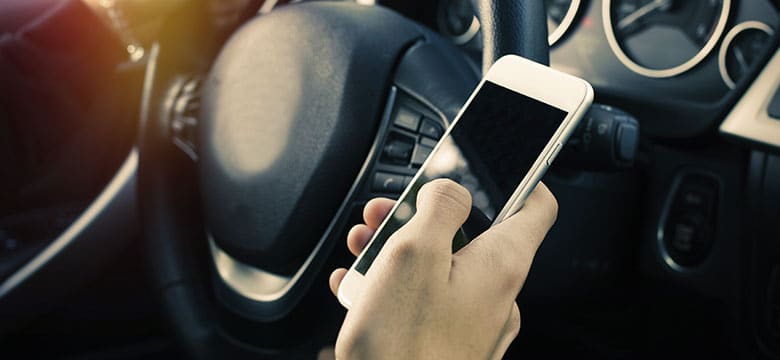Is the ‘Breathalyzer for Texting’ Too Invasive?
Apr 12 2019, by in Criminal Defense, Legal Blog, Technology & Law, Traffic Defense
If you have been paying attention to the numerous public service announcements (PSA) and safety campaigns, it is evident that distracted driving is deadly. According to the National Highway Traffic Safety Administration, the use of a cell phone was involved in nearly 15% of the 391,000 injuries and 3,477 deaths that resulted from distracted driving in 2015. In 2017, the most recent year where data is available, distracted driving claimed 3,166 lives. The death toll of texting and calling from behind the wheel shows no sign of slowing. This has prompted state governments to consider various policies to radically reduce drivers’ use of cell phones, including the introduction of the Textalyzer–a Breathalyzer for texting.
Pennsylvania’s distracted driving laws are relatively permissive when compared to other states. For one, there are no restrictions on talking on the phone while driving. However, the law does prohibit the use of an “interactive wireless communication device” to write, send, or read texts, instant messages, and emails. A violation of these distracted driving laws is a summary offense, the least severe offense category. But, if your texting leads to a serious accident or a death, you could face criminal charges for reckless driving or homicide by vehicle. If you have been charged with such an offense, you’ll be facing harsh penalties.
You will need a skilled traffic lawyer to avoid criminal penalties like a license suspension, crippling fines, and jail time. Call Fienman Defense today at (215) 839-9529 for a free consultation about your case.
What Is the Textalyzer?
The Textalyzer is a recent invention that is being marketed by Cellebrite, an Israeli digital forensics company. It’s a tablet-sized device that connects to your phone and provides a report of any activity performed that required tapping, typing, or scrolling. For example, the device can tell if you were using Whatsapp or Facebook, whether you were using them in a hands-free mode, and when these apps were being used.
The underlying purpose of the Textalyzer is not to help the police give out fines to distracted drivers. It’s to enable investigations into reckless driving or vehicular homicide cases. If someone causes a severe accident, a police officer with a Textalyzer can scan the driver’s phone to determine if they were texting shortly before the accident. Currently, officers are required to obtain a warrant or consent to search a phone and download its contents. By the time the warrant is obtained, a guilty driver could already have wiped their phone.
Who Opposes Textalyzers?
There are currently no Textalyzers in use in the United States. The state of New York introduced legislation in 2016 that would equip some officers with the devices, but the bill stalled in committee. This year, Nevada has introduced similar legislation, and it’s too early to tell if that bill will fare any better. The original version of the Nevada proposal included a 90-day license suspension for a refusal to let the police run a Textalyzer test on your phone, but the version now under consideration does not have any penalties for a refusal.
In both Nevada and New York, the deployment of textalyzers has privacy advocates worried. In a statement to the Huffington Post, a lawyer for the New York Civil Liberties Union questioned whether “the technology can accurately tell if the driver was using the phone while driving and whether it’s capable of capturing private or personal information on the phone.” The firm that designed the device, Cellebrite, specializes in giving law enforcement and the military access to mobile devices by bypassing lockscreens. Unlike their other products, Cellebrite insists that the Textalyzer does not give the police access to the contents of your phone.
The real question is whether the police are breaching your right to privacy when they access the information provided by a Textalyzer. The Supreme Court has traditionally been willing to reduce people’s expectation of privacy when they are driving, so it’s possible that the Textalyzer–like the Breathalyzer–will become an accepted law enforcement tool. In any event, a legal challenge to any Textalyzer law will probably happen only if the government decides to punish your refusal to allow your phone to be scanned. So far, no states seem to be entertaining that possibility.
If you are involved in a serious accident, the police may obtain a warrant to search your cell phone to determine whether you were driving distracted, and they may also access your phone records. For now, there is no need to worry about Textalyzers in Pennsylvania. The introduction of the device in this state will happen years in the future–if at all.
Contact Fienman Defense
If you or a loved one has been charged with reckless or distracted driving in Philadelphia, Montgomery County, Delaware County, or Bucks County, Fienman Defense can help. As an experienced traffic lawyer, attorney Michael Fienman knows the importance of preserving your driving record and protecting your license, not to mention your right to privacy if you are stopped by the police.
Call us today at (215) 839-9529, and we’ll set up a free, initial consultation.
The information contained or referenced in this blog is accurate as of the publication date.


